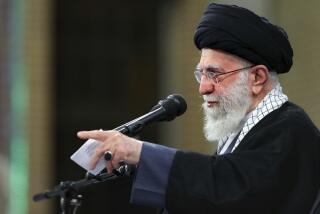Iranian Jew Denies Spying; Brother Confesses
- Share via
SHIRAZ, Iran — A suspect in Iran’s Jewish spy trial pleaded not guilty Wednesday, becoming the first of seven defendants heard so far to deny the state’s allegations of membership in an Israeli spy ring.
Farzad Kashi told the closed-door session of the Revolutionary Court that he was not guilty of passing material to Israeli intelligence, his lawyer told reporters after the hearing.
“ ‘I have done no wrong and therefore there is no wrong for me to admit,’ ” defense lawyer Esmail Nasseri quoted his client as telling the court, not long after his older brother Faramarz Kashi confessed his own guilt.
Six of the Iranian Jews on trial have acknowledged supplying information to Iran’s archfoe Israel. They cited religious conviction and financial need as their motivation.
Thirteen Iranian Jews and nine Muslims were accused of spying for Israel.
Hossein Ali Amiri, the head of the local judiciary, said after the hearing that Faramarz Kashi was first recruited to spy for Israel in 1985 by an unnamed Iranian now living in a third country.
He told a news briefing that Kashi handed over details of the barracks where he did his military service and then turned over information on military installations in and around Shiraz, which is home to a large air base.
The trial has generated concern in the West, where U.S. Secretary of State Madeleine Albright has warned that the outcome could have international repercussions. Defense lawyers question the fairness of the no-jury revolutionary court, where the judge is also the prosecutor.
Defense lawyers have acknowledged that some of their clients collaborated with Israel but say the suspects provided nothing classified or harmful to Iran’s national security and therefore should be exempted from espionage charges and a possible death sentence.
Israel has denied that any of the defendants were its spies.
The 25,000 Jews in Iran--the largest Jewish community in the Middle East outside Israel--have faced some government restrictions since the 1979 Islamic Revolution but have been free to practice their religion and face little overt discrimination.
More to Read
Sign up for Essential California
The most important California stories and recommendations in your inbox every morning.
You may occasionally receive promotional content from the Los Angeles Times.













